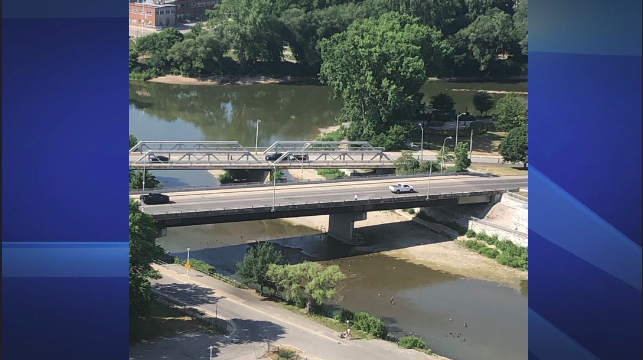The heat warning that was issued towards the end of June has followed into July, giving London, Ont., and nearby region plenty of sunshine and hot summer days.

But with plus 30 C temperatures daily for nearly two weeks, the heat has caused trouble for nearby farmers and nature as well.
A photo was posted on Twitter Tuesday morning showing a section of the Thames River underneath a bridge in London. The bottom of the river was visible and appeared to be dried up.
Steve Sauder with the Upper Thames River Conservation Authority says the flow of the Thames River was within normal range in June, but the extended heat is now causing areas of the watershed to become too dry.
“That’s problematic for not only plants but also aquatic species… it creates stress,” said Sauder.
He says he’s looking forward to Tuesday night and over the weekend when a few showers are expected.

However, different rain levels are often expected in different areas, according to Sauder, which is why “some areas right now, particularly in the St. Marys and Stratford area, there are some very dry pockets that are creating stress for some of the agricultural crops as well as along the river.”

Get daily National news
Rick Howe, the middle brother and also one of the owners of the Howe Family Farm Market in Aylmer, Ont., knows firsthand how much trouble an extended heat warning can cause.
Howe told 980 CFPL Tuesday the farm is currently in the middle of its annual strawberry harvest.
“With harvesting such a sensitive and perishable fruit (that is) very much affected by the heat, we’ve changed our starting time in the morning,” explained Howe.
“Usually, we try to irrigate to cool things down in our fields, and come back and start picking again in the evening.”
Other crops now require regular irrigation too, such as the family’s watermelons, pumpkins and sweet corn.
Howe says he believes the farm is likely spending an extra $10,000 to $20,000 this year to fuel irrigation due to the extended heat.
While a few hot summer days are expected year after year, the middle brother says there’s a new set of challenges this year due to the COVID-19 pandemic.
“The PPE that employees are wearing are magnifying heat exposure. … It’s just a whole new (stress) added to the harvest.”
There are crews working at night to avoid extreme temperatures, and Howe says their family farm has spent another few hundred or thousands of dollars purchasing PPE, hand sanitizer and building new equipment to ensure physical distancing guidelines are followed.

Elsewhere, the extended heat is not helping trees battle explosive outbreaks of gypsy moths in Port Franks and Lambton Shores.
“Normally when you have trees that become defoliated from those caterpillars eating the leaves, they will be able to regenerate when we get enough rain and cooler weather,” Sauder explained.
“But having this heat and a lack of rain is (not good) for those trees this year, because they don’t have the energy to grow their leaves back.”
Environment Canada’s heat warning for London and area remain effective, and temperatures are set to reach 33 C or higher until this weekend.












Comments